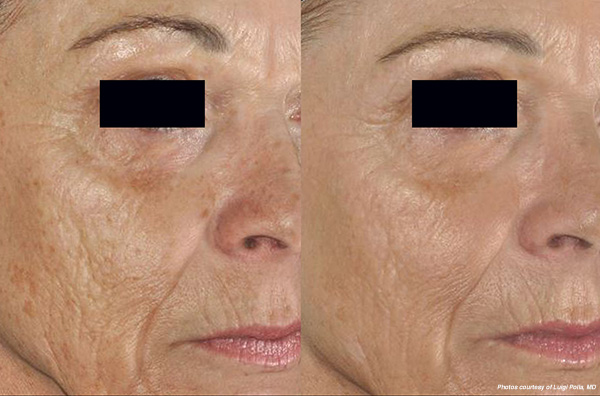
Have you ever looked in the mirror and wished you could smooth the texture of your skin, fade pores, erase acne scars, diminish wrinkles, or fade sun spots? Of course you have, and you have options.
But when it comes to skin rejuvenation techniques, how can you know which one is right for you? Let’s talk about two popular techniques, laser skin resurfacing and chemical peels, so you can choose the best procedure for you.
What is Laser Skin Resurfacing?
Laser resurfacing is a cosmetic treatment that involves using concentrated beams of light to reduce wrinkles and skin irregularities. The laser removes the outer layer of skin (the epidermis) while simultaneously heating the underlying skin (the dermis). These effects promote cell turnover and stimulate the growth of new collagen fibers. As the treated area heals, the skin becomes smoother and firmer.

Benefits of Laser Resurfacing
Laser resurfacing can effectively treat fine lines and wrinkles, acne scars, age spots, and uneven skin tone. So, if you’re struggling with any of these issues, especially if they are severe, this could be a solution worth considering.
It can also tighten loose skin and improve the overall texture of your skin. Because laser resurfacing causes collagen production, it can be extremely effective on skin that is saggy or has lost volume.
Considerations with Laser Resurfacing
Every treatment option has its pros and cons. Laser skin resurfacing gets excellent, noticeable results, but when considering which treatment to choose, you should also think about the disadvantages of each option.
Laser resurfacing can be more expensive than other skin treatments due to the high level of skill required and the special equipment required. However, many people find the results to be worth the investment. Patients may experience redness, swelling, bruising, and other minor side effects. These may be more significant with laser skin resurfacing than with chemical peels.
What is a Chemical Peel?
A chemical peel is a different type of skin-resurfacing procedure during which a chemical solution is applied to the skin’s surface to remove the top layers. After a chemical peel, cell turnover will mean skin becomes smoother and younger-looking.
Benefits of Chemical Peels
Chemical peels can treat various skin issues, including wrinkles, skin discoloration, and mild scarring. They can also improve the overall look and feel of your skin. If you’re dealing with persistent acne or acne scars, a chemical peel could be your ticket to clearer, healthier skin.
Generally, chemical peels are less expensive than laser resurfacing. And while both procedures tend to have very little downtime and few side effects, because chemical peels only work at the surface level, the recovery will likely take less time.
Considerations with Chemical Peels
Although peels may be less costly, the results may not be as drastic as laser skin resurfacing, and many patients need multiple sessions to achieve the desired results. Also, the results of a chemical peel are not permanent. Although, skin improvement lasts several months.
Which is Better?
The answer largely depends on your specific skin concerns, your budget, and your comfort level with each procedure.
Both treatments can significantly improve the look and feel of your skin, but they do so in different ways and with varying levels of intensity. Laser resurfacing might be a better choice if you have deep wrinkles, severe sun damage, or significant scarring and are looking for a longer-lasting result. Chemical peels could be a more suitable option if you have mild to moderate skin issues or acne or if you are looking for less impact on your budget.
Get Expert Advice
Ultimately, the decision is yours, but remember – you’re not on your own. Consult with our skin care professionals to discuss your options in detail. We can help you evaluate the benefits, risks, and costs associated with each procedure and guide you in choosing the treatment that’s best for you.
